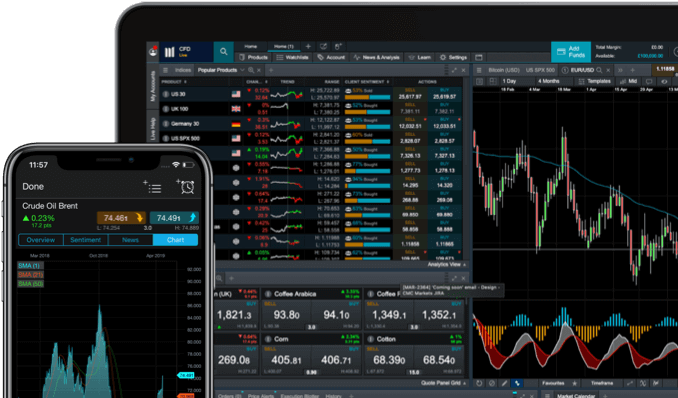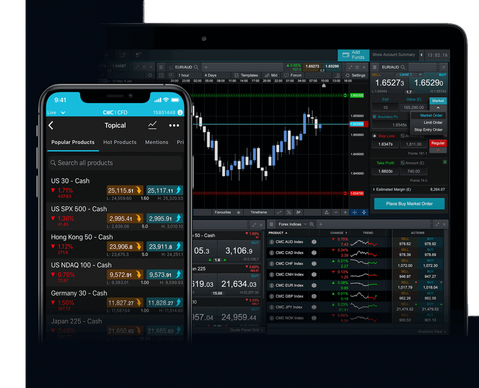
Futures vs options
In this article, we explain some of the differences and similarities between two of the most popular and common derivatives contracts, futures and options, while also looking at the benefits and risks of each and potential alternatives.

Overview of futures and options contracts
Futures and options are financial contracts used for hedging and speculation. Both products allow traders to participate in price moves without owning the underlying asset. This means trades can be leveraged and typically last one year or less, making them suitable for short-term traders.
Read on to find out about the differences and similarities of these products and to see which is more suited to you. It’s worth noting that we don’t currently offer futures or options; instead, we offer forward contracts, which work in a very similar way in its functionality.
Future vs options: the key differences
Obligation and right
Futures are an obligation (that you get out of by closing the trade) to buy or sell the underlying asset in the future to another party, whereas buying an option provides the right – not the obligation – to buy or sell the underlying asset at a future date.
With a futures contract, a trader pays the current price of the contract but doesn’t have to take delivery or receive the underlying asset until later. They can buy an asset today to be delivered to them in six months. If the price is higher in six months, they would profit for locking in a lower price. If the price is lower in six months, they would incur losses because they paid a higher price than needed.
Meanwhile, buying an option is used if a trader may want to buy or sell the underlying asset in the future. Assume a trader buys an option with a chosen strike price (the price at which a contract can be exercised or settled against) and expiry. If the price of the underlying asset is above the strike price for a call option or below the strike price for a put option, they have the right to buy (use a call option) or short (sell a put option) the asset at the strike price. But upon taking the trade, they are not obligated to buy at the strike price.
Buying and selling
Futures traders tend to buy a contract if they think the underlying asset will rise. Otherwise, they could short sell (before buying) the contract if they think the underlying asset will fall. Learn how to short a stock with our detailed guide.
Options are divided into puts and calls. A trader can buy a put if they expect the price of the underlying to drop before expiry. If they expect the price of the underlying to rise before expiry, they can buy a call.
Expiry date length
Futures expiry dates can be many years in the future, usually expiring on the same day each month or quarter, whereas option expiry dates are typically a year or less; usually weekly, monthly or quarterly, depending on the underlying market. Options that expire more than a year into the future are called long-term equity anticipation securities.
What happens at expiry
Futures speculators aren’t usually interested in delivering or receiving the underlying asset, as they are more interested in participating in the price changes. If a trader believes an asset’s price will be higher in a day, week, month, or year, they could buy a futures contract on the spot. If they are right, and the price is higher in the future, they could sell their contract before expiry and profit from the price difference.
Speculators tend to close their trade before the contract expires, otherwise they are obligated to deliver or receive the underlying asset or settle the value of the contract in cash.
As for options, if a trader believes a stock may move up to £65, say, over the next six months and it is at £60 right now, they may choose to buy an option contract for £1 (called the premium), that gives them the right to buy the stock at £60 (the strike price) for the next six months.
If the underlying stock goes to £65, they could use their option to buy the stock at £60 and then sell the shares at the current price of £65, reaping a profit (less than the cost of the option). Or they could sell the option and reap a profit of approximately £4 because the option provides a profit of £5 (£65-£60, less the £1 paid for the option). If the stock drops, they could do nothing and lose the £1 paid for the option. They can also sell the option before expiry to potentially recoup part of the premium cost.
Potential losses
In order to prevent future losses, some traders use controls such as a stop-loss order, as the price can rise or fall indefinitely (even below zero). Since a futures contract is an obligation, that obligation persists regardless of price until the obligation/trade is closed.
When buying an option, the maximum loss is the cost of the premium paid no matter how much the underlying asset price moves.
Leverage
Futures are often traded using leverage, which means controlling a lot of underlying assets with a small amount of cash. With options, you pay a premium to potentially see a profit or loss on price movements of the underlying asset.
For futures, a trader is required to have only a small portion of the value of the underlying asset in their account. For example, a forward contract (that we offer as an alternative to futures; see below for more about this product) is very similar to a futures contract, and the trader is required to have only 5% of the bet size in their account. Trading a contract worth £1,000 of underlying product requires only £50 in the account to initiate the trade.
With options, a trader may buy, say, three £3 option contracts on a £70 stock for £900. This means they have the potential to control 300 shares of stock (100 shares per contract). The stock has a value of £21,000 (300 x £70). This is like leverage, but unlike a future, the options trader owns only the option and is not obligated to buy the £21,000 worth of stock.
Are forwards a more flexible financial product?
We don’t offer futures or options trading, but we do offer trading on forward contracts, which are nearly identical to futures contracts. The main difference is that futures are traded through an exchange, whereas forwards are traded “over-the-counter” through a broker. Also, there are no overnight holding costs for a forward, whereas there are for a cash market (no expiry date) transaction.
Trade on forward contracts with us
Futures vs options: The key similarities
- Both contracts have expiry dates.
- Both markets provide a way to participate in the underlying asset without owning it.
- Both provide exposure to a market with a smaller amount of cash than having to buy the position outright.
- Both have a current price, which changes through to expiry based on the performance of the underlying asset.
- Both speculators can profit (or lose) from the price difference they buy and sell at.
- Both are traded through exchanges that oversee all transactions.
- Both can be used for speculative purposes or to hedge other trading positions.
When might you pick one over the other?
Both markets have their uses. A futures contract is useful if you want to take a position right now to profit directly from price movements in the underlying asset over a certain timeframe. A futures contract is also useful if you want a lot of leverage, which can magnify potential profits (and losses).
An option contract may be more suitable if you want to cap potential losses to the premium paid while still gaining exposure to the underlying asset. This can be useful, for example, when a stock has earnings. You could buy a call if you expect a big upward price move. If it happens, you likely profit, but if the stock plummets, you have capped your risk at the premium paid. Options are also useful if you only want to own (call option) something in the future if it exceeds the strike price.
What are the costs related to trading futures?
When trading futures, you will pay a commission to enter and exit the trade. If the position is not closed before expiry, the contract must be settled with cash or delivering/receiving the underlying asset.
For example, with an oil contract, if you were a buyer of the contract, you will be receiving 100 barrels of oil which you must pay full price for (contract price paid x 100 barrels). Or, you must settle the difference between your buy and sell price for the contract with the seller.
As an alternative, when trading forward contracts with us, you are speculating on the price movement of the contract, so are never on the hook for delivering/receiving anything. At the end of the contract, you are able to roll it over to the next contract to maintain your exposure to the trade.
What are the costs related to trading options?
You typically pay a commission to enter and exit an options trade, as well as a premium typically, which is the cost of the trade/wager.
If the underlying asset is above the strike price at expiry for a call or below the strike price for a put, then the option is considered ‘in the money’. This means the buyer of the option assumes the position underlying the option. This can result in additional cash outlays.
FAQ
Which is more profitable: futures or options?
Any financial market can be profitable or result in losses. Whether futures or options result in more profits depends on the trader’s strategies, trading style and personality, rather than the product. Consult our risk-management guide for more information on how to combat risk of losses.
Which is better for hedging downside risk?
Options and futures can both be used to hedge downside risk. Options may be cheaper in that you only pay the premium, and losses are limited to that if a downside drop doesn’t occur. Learn more about hedging strategies.
Can you make money trading futures?
There are traders in all markets that are able to make money. It is the strategies and methods used that determine profit, as well as luck and the state of the financial markets.
What other financial products might be relevant?
Forward contracts are similar to futures in their functionality and you can spread bet or trade CFDs on forwards via our Next Generation trading platform. Forwards also tend to be more cost-efficient than trading the cash market as there are no overnight holding costs.
Disclaimer: CMC Markets is an execution-only service provider. The material (whether or not it states any opinions) is for general information purposes only, and does not take into account your personal circumstances or objectives. Nothing in this material is (or should be considered to be) financial, investment or other advice on which reliance should be placed. No opinion given in the material constitutes a recommendation by CMC Markets or the author that any particular investment, security, transaction or investment strategy is suitable for any specific person. The material has not been prepared in accordance with legal requirements designed to promote the independence of investment research. Although we are not specifically prevented from dealing before providing this material, we do not seek to take advantage of the material prior to its dissemination.

